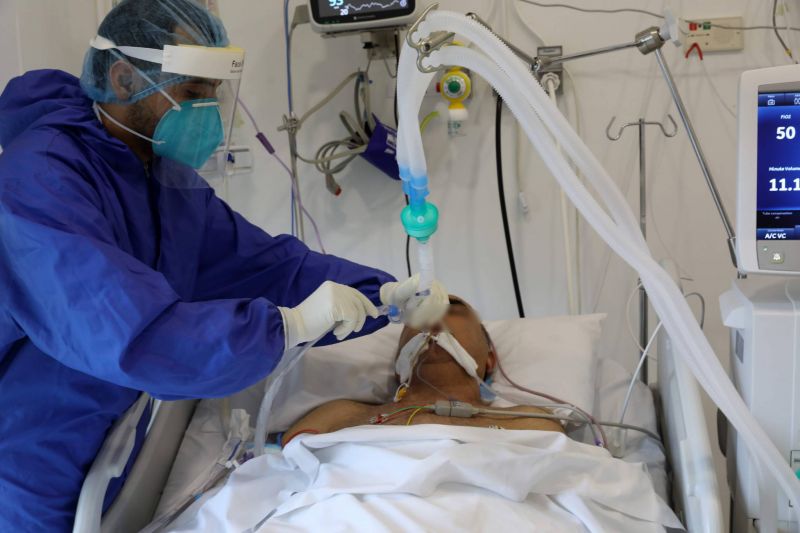
A patient receives care for COVID-19 in an ICU at Lebanese Hospital Geitaoui on Thursday. (Credit: Anwar Amro/AFP)
Want to get the Morning Brief by email? Click here to sign up.
Parliament meets this afternoon to vote on a fast-tracked law authorizing the emergency use of COVID-19 vaccines. While Lebanon has paid a deposit for vaccines from Pfizer, the pharma giant reportedly will not ink the deal until the country waives it of responsibility, requiring the quick drafting of a new law. The urgent law, which was speedily approved by Parliament’s health committee on Wednesday, grants a two-year warrant for emergency use of all coronavirus vaccines. Parliament’s meeting at UNESCO Palace in Beirut comes as approximately 20 staffers at the legislature have tested positive for COVID-19, an MP told L’Orient Today. Meanwhile, MP Joseph Ishac is in critical, but stable, condition in an ICU after contracting the virus.
Amid an alarming spike in COVID-19 cases, the country enters its first weekend under a new 24-hour lockdown. Under the stringent restrictions, most businesses are required to close while essential services such as grocery stores, supermarkets and restaurants are permitted to open for delivery until the afternoon. Streets normally suffocated with heavy traffic were clear yesterday, while the owner of the Fahed supermarket chain said his company was on top of delivery orders following three days of panic buying. With the total lockdown set to last until Jan. 25, Lebanon is embarking down a fraught tightrope between a health sector overwhelmed by COVID-19 and a vulnerable population that will struggle to make ends meet due to state failures to provide adequate aid.
Lebanon notched a dark new record COVID-19 death toll of 41 yesterday, two weeks after New Year’s Eve parties permitted by the government’s near-nonexistent restrictions. Hospitals have flooded with new patients, with the under-strain staff at Rafik Hariri University Hospital — one of the front-line facilities battling the virus — forced to turn back people suffering from the virus. St. Georges Hospital in Hadath, where caretaker Health Minister Hamad Hassan is receiving care after contracting COVID-19, announced yesterday that it had to convert its cafeteria to receive patients after its beds were filled.
The country is bracing for more storms this weekend, with the ever-present risk of flooding. Heavy rains are forecast until next week, with snowfall starting at an altitude of 1,600 meters after snow blocked a number of roads between Arz and Kfar Zebian and Baalbeck last night, the NNA reported. The governor of Baalbeck-Hermel, Bachir Khodr, has placed the Disaster Risk Management unit in the eastern region on alert to handle any possible emergencies from the rough weather. Lebanese authorities have come under heavy criticism for chronic infrastructure failures that often lead to floods following heavy rains.
A shepherd kidnapped by Israeli troops along the border with occupied Palestine has yet to be released, amid talks to secure the Lebanese man’s freedom. Lebanon’s envoy to the United Nations, Amal Mudallali, lodged a complaint with the Security Council over Israel’s abduction of Hassan Qassem Zahra on Wednesday afternoon while he was attending to his flock. UNIFIL spokesperson Andrea Tenenti told L’Orient Today last night that the peacekeeping force’s commander was in touch with Israeli forces regarding the incident, which it was investigating. Meanwhile, the Israeli military made the dubious claim that the shepherd was affiliated with Hezbollah, without offering any credible evidence.
French investigators questioned a disgraced Lebanese businessman in Beirut regarding blockbuster charges against former French President Nicolas Sarkozy. A judicial source told AFP that two investigative judges and financial prosecutor deposed Ziad Takieddine, a Lebanese-French dual national, for several hours at the Court of Cassation regarding charges Sarkozy’s 2007 presidential campaign received financing from Libya. Lebanon’s top public prosecutor imposed a travel ban on Takieddine in December pursuant to a French arrest warrant. The notorious arms dealer — who has walked back his allegation that he delivered money from late Libyan strongman Muammar Gaddafi to Sarkozy — was convicted by a French court in June in another case related to a weapons deal.